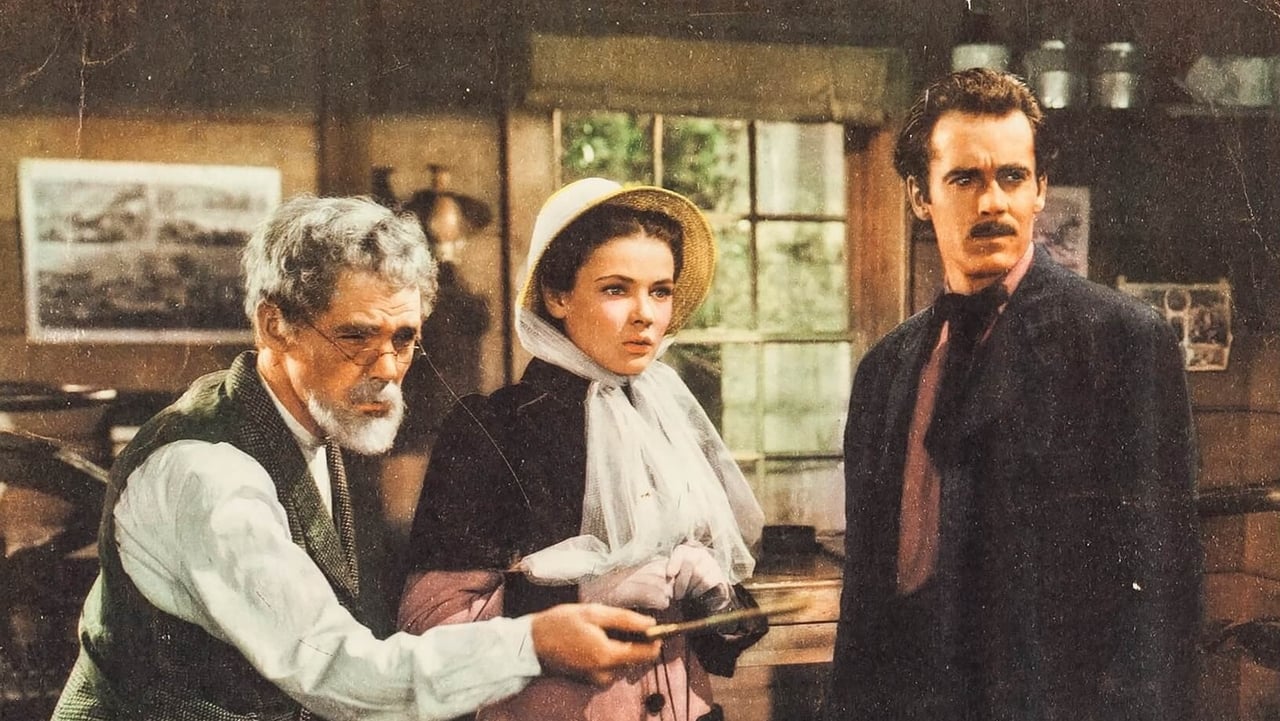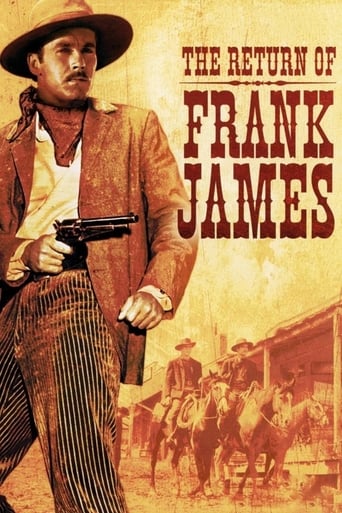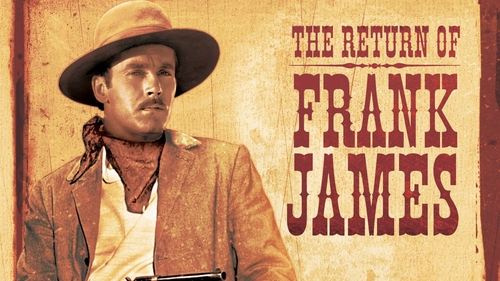



Very disappointed :(
Excellent, smart action film.
Am i the only one who thinks........Average?
This movie tries so hard to be funny, yet it falls flat every time. Just another example of recycled ideas repackaged with women in an attempt to appeal to a certain audience.
View MoreOK, but not great. Historically fairly inaccurate, and contains some cringeworthy over-acting, most particularly from Henry Hull as Major Cobb. Henry Fonda is miscast as Frank James - it is very difficult to believe that he is an outlaw. He just seems too "nice".Still, it is fairly entertaining and gripping. Gene Tierney lights up the screen.For a good movie on the murder of Jesse James and an accurate portrayal of the demise of Robert Ford rather watch "The assassination of Jesse James by the coward Robert Ford" (2007).
View MoreTHE RETURN OF FRANK JAMES (20th Century-Fox, 1940), directed by Fritz Lang, is a continuation to the 1939 blockbuster hit JESSE JAMES (1939) starring Tyrone Power and Henry Fonda as the outlaw James brothers. Repeating its opening and closing credit score conducted for JESSE JAMES, along with its Technicolor splendor and location filming that served the earlier film so well, FRANK JAMES elevates Fonda from secondary character to top draw leading attraction. While this extension might have reused the services of JESSE JAMES director Henry King, it comes of a surprise in having, not Howard Hawks or John Ford whose best films happen to be westerns, but the European born Fritz Lang. Yet, under his watch, the result of THE RETURN OF FRANK JAMES is every bit as good as the original.The fade-in begins with the closing minutes of JESSE JAMES where the wanted outlaw (Tyrone Power) gets shot in the back by his friend, Bob Ford (John Carradine) as his brother, Charlie (Charles Tannen) watches. Eliminating the eulogy given by Rufus Cobb (Henry Hull) that closed the original film, THE RETURN OF FRANK JAMES opens its new chapter with newspaper headlines depicting the death of the notorious outlaw, and the disappearance of his brother, Frank James, after the Northfield robbery, now believed to be dead. Frank (Henry Fonda), however, isn't dead, but living a secluded farm life in the Ozarks under an assumed name of Ben Woodson. He's accompanied by the family farmhand, Pinky Washington (Ernest Whitman), and Clem (Jackie Cooper), an orphan teenager whom Frank had taken in following the death of his father. It is Clem who runs over to Frank with the news about Jesse James murder and the arrest of the Ford brothers. After learning the Fords were set free from the judge a half hour of the guilty verdict from the jurors, and having collected the $10,000 reward on Jesse, dead or alive, Frank breaks from his seclusion to take the law into his own hands by avenging his brother's killers. Along the way Frank and Clem, now acting as his tag-along sidekick, encounter Eleanor Stone (Gene Tierney), a reporter for the Denver Star, hoping for a good story or else her father Randolph (Lloyd Corrigan), owner of the newspaper, would send her off to college instead.Aside from the tobacco chewing Henry Fonda playing Frank James, others reprising their original roles from JESSE JAMES include the ever reliable Henry Hull (Major Rufus Cobb, editor of the Liberty Weekly Gazette still using the catch phrase, "Shoot them down like dogs"); J. Edward Bromberg (George Runyan, the railroad detective out to expose Ben Woodson as Frank James); Donald Meek (McCoy, the railroad president responsible for having the Ford brothers betray their leader, Jesse, and arranging for their pardon); and George Chandler(Roy, Cobb's typesetter). New members of the cast include George Barbier (Judge Ferris); Eddie Collins (The Station Agent); Barbara Pepper (Nellie Blane, stage actress); and Victor Kilian (The Fanatic Preacher).For Gene Tierney's movie debut, she gets no special introduction in the credits. Only her name comes billed second under Henry Fonda, which is an honor for any newcomer. A dark beauty with girlish sounding voice reminiscent in both factors to an early 1930s actress, Sidney Fox (best known for 1932s "Murders in the Rue Morgue"), Tierney doesn't play a love interest but one interested in reporting the news that's fit to print. She does quite well in her first try as a movie actress, and would improve with each succeeding movie before reaching her peak with LAURA (20th Century-Fox, 1944).As with JESSE JAMES, THE RETURN OF FRANK JAMES, with original screenplay by Sam Hellman, toys with the facts, resulting to better screen entertainment. While the first hour depicts on Frank's vengeance on the Ford brothers, with a tense moment having the Fords acting on a stage play "The Death of Jesse James" observe Frank sitting in the theater box looking down at them, the second half shifts to courtroom proceedings with Frank accused of a murder and Major Cobb acting as his defendant. Though Fritz Lang may have avoided borrowing from Henry King's directorial style from JESSE JAMES, interestingly, the courtroom segment comes as a sheer reminder to John Ford's YOUNG MR. LINCOLN (1939) also starring Henry Fonda, by using humor over tense action for the proceedings. Like King, Lang keeps the pace moving with exciting horseback chases and shootouts, something very much expected for any western.Though the second and last of the Frank and Jesse James westerns for the studio, this wasn't the last depiction on their lives presented on screen. Lippert Studios independently produced two totally different adaptations, I SHOT JESSE JAMES (1949) and THE RETURN OF JESSE JAMES (1950), with the latter co-starring Henry Hull in a different character portrayal. Other numerous westerns on the Jesse and Frank James would follow for many years to come.Distributed to home video and later DVD, THE RETURN OF FRANK JAMES consisted of cable TV broadcasts as Turner Network Television (1994-95); American Movie Classics (1999-2005); Fox Movie Channel, Encore Westerns, Turner Classic Movies (TCM premiere: December 27, 2012), among others. With this much television exposure, Frank James should become more legendary than his kid brother, Jesse. (***1/2)
View MoreSome things in cinema never seem to change. The cash-in sequel is one of them. Fox's 1939 Production of Jesse James was an almost perfectly constructed example of that rare thing – a Western drama. Sure, it had an appropriate amount of action and cowboy business, but it also granted depth and humanity to its characters, giving as much weight to its intimate moments as its rip-roaring ones. In contrast, The Return of Frank James is a hearty cliché-fest, cheaply made and with an uncomplicated script by the disappointingly un-prestigious Sam Hellman.The director here is Fritz Lang, a man now best remembered for his starkly Germanic silent pictures, and the poverty row noir thrillers he made later on. A heroic Western would seem to be the absolute antithesis of his comfort zone. But there was another Fritz Lang, one of carefree, comic-book adventure, who made pictures like The Spiders, Frau im Mond and The Tiger of Eschnapur. True to the simplistic material, Lang shoots the action scenes with an emphasis on pace and excitement. And yet you can recognise his outsider's approach to the genre. Rather than showing off the vastness and beauty of the old west, he presents it as a harsh, almost alien terrain, full of barren mountains and spiky trees. But this doesn't come across as a cynical rejection of the romanticism of the frontier – after all he still draws attention to natural beauty in the scenes at the farm. It seems more the case that Lang wishes to show the west as a perilous landscape, making the adventure more frantic and the danger more genuine.You might also expect a director like Fritz Lang, whose shot composition was all about piercing shadows and swathes of grey, to struggle on his first Technicolor assignment. However Lang makes brilliantly restrained and practical use of colour, and really its no wonder since he pays such attention to detail in his shot compositions. In the first few scenes he strictly limits himself to a scheme of yellows and greys. Then, when Henry Fonda realises it's time to hunt down the Fords, we are suddenly jolted by a close-up of his gun wrapped in a bold red cloth. Throughout the picture Lang uses colour schemes to give mood and tone to each location, and even help define character. In the scene where Gene Tierney's character is first introduced, she is wearing a grey and maroon outfit that blends in with the plush décor of the hotel parlour.As with many directors with a strong visual style, Lang's Achilles heel was getting the best out of his actors. Lang seems to have had a particular fondness for hams and hamminess, and does not seem to have encouraged naturalism. The camera seems to linger longer than strictly necessary on the cartoonish comedy business of Henry Hull and Ernest Whitman. Henry Fonda seems barely interested and does little more than recite his lines. Gene Tierney is rather feeble, although to be fair this is her screen debut. Jackie Cooper is merely average. To be fair though, the screenplay doesn't really give any of the leads a chance to show off their dramatic skills. On the other hand, John Carradine, who for a primary villain has a bizarrely small part with virtually no dialogue, is nevertheless at his dastardly best, and effectively menacing in his wordless appearance at the end of the court scene.Lang by now had a reputation as a tyrant on the set and a pain to producers, and as such he was now being passed from studio to studio and assigned second rate projects like this. And while he clearly had respect for the American motion picture, he had become and would remain a Hollywood misfit. I suspect Henry Hull's constantly referring to Frank James' gun as a "weepon" may even have been a cheeky joke at the expense of Lang, who might have unknowingly been making the same mispronunciation. And yet it is really only Lang's odd yet innocently enthusiastic take on the Western that gives The Return of Frank James character, and make it at all worth watching today.
View MoreReturn of Frank James, The (1940) *** (out of 4) Fritz Lang directed this sequel to Jesse James, which picks up right after the Ford Brothers shot Jesse in the back. Hearing that the brothers got off with murder, Frank (Henry Fonda) comes out of retirement to seek revenge. This film isn't quite as good as the original but it's still a very worthy follow up with strong direction and some really good performances. Fonda is good as usual but it's Henry Hull who steals the show as the grumpy newspaper owner. John Carradine, Gene Tierney and Jackie Cooper are all equally impressive. The ending is terrific but I personally thought the courtroom scene went a little too over the top in the comedy.
View More